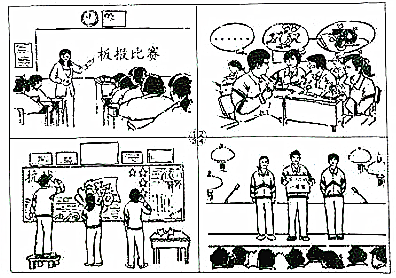
| Outline | Supporting details |
| (71)IntroductionA to family structure | Family structure is of great (72)importance/significanceA in different cultures. Children raised in a family will gradually learn how to (73)behaveA in a way which is acceptable in their culture or setting. 'Many cultural differences (74)arise/result/come/originateA from family structures. |
| Examples of Asian families | Traditional Asians (75)center/centreA their lives around family.Not only the individual but the family is to (76)blameA for any wrongdoings. O In China,parents'sacrific es will probably (77)payoff when children grow up.Children will also provide for the elders. O In Vietnam,it's not from the personal desires but from family considerations that decisions or actions are done. In Japan,children are (78)unwilling/reluctant/afraidA to share their emotions with father,thus making communication difficult. |
| Examples of families in the USA | Americans don't lay much emphasis on family values.(79)Instead/HoweverA personal achievement is considered more important. |
| Conclusion | Family structures and values (80)vary/differA in different cultures. |
分析 文章大意:本文讲的是家庭结构是任何文化的核心.家庭的一个重要作用是一个文化的新成员社会化,当孩子在家庭里面被抚养长大,他们不仅学会成为家庭成员,还要学会成为更大的文化的成员.然而,许多文化差异存在于家庭结构及其价值中.文章从中国、越南、美国三个国家的家庭观念作了分析,在一些文化里,家庭是生活的中心,而在其他文化里,个人是首要的;在一些文化里,家庭的声誉依靠每个人的行为,在其他文化中,个人行为可以不用永远影响家庭;有些文化尊重老人,而其他文化轻视老人.
解答 71.Introduction 根据第一段内容可知本段对家庭结构作了详细的介绍.
72.importance/significance 由第一段Through the observations and modeling of the behavior of other family members,children learn about the family and society including the values of the culture.Family structure and their inherent relationships and obligations are a major source of cultural difference.可知家庭结构在不同文化中是非常重要的.
73.behave 根据文章第一段As children are raised in a family setting,they learn to become members of the family as well as members of the larger culture.The family provides the model for all other relationships in society可知家庭的一个重要作用是一个文化的新成员社会化,当孩子在家庭里面被抚养长大,他们不仅学会成为家庭成员,还要学会成为更大的文化的成员.
74.arise/result/come/originate 根据Family structure and their inherent relationships and obligations are a major source of cultural difference可知,家庭结构和他们的内在的关系以及义务是产生文化差异的主要根源.
75.center/centre 根据文章第二段中的Asian families are often extended,including several generations related by blood or marriage living in the same home可知亚洲文化比较重视家庭观念,以家庭为中心.
76.blame 根据文章第二段中的An Asian person's misdeeds are not blamed just on the individual but also on the family-including the dead ancestors可以确定答案.
77.pay 根据文章第二段中Children repay their parents'sacrifices by being successful and supporting them in old age.This is accepted as a natural part of life in China可以判断在中国孩子们会回报父母所做出的牺牲.
78.unwilling/reluctant/afraid 根据文章第三段中的Japanese college students in one study said they would tell their fathers just about as much as they would tell a total stranger.The emotional and communication barrier between children and fathers in Japan appears very strong after children have reached a certain age可知,日本的孩子不愿意跟父亲交流.
79.Instead/However 根据文章第四段最后一句话More important is a person's own individual"track record"of personal achievement可知美国人不注重家庭观念.
80.vary/differ 根据文章最后一段的第一句话 many cultural differences exist in family structures and values可知家庭结构和观念在不同的文化中是不一样的,由此可确定答案.
点评 本题是阅读填空.阅读填空题是任务型阅读的一种,它注重考查考生总体把握文意及细节理解的能力,要求考生有较高的阅读及表达能力,因此考生平时要加强阅读,做题时要结合语境反复推敲做出正确的判断.


科目:高中英语 来源: 题型:短文改错
查看答案和解析>>
科目:高中英语 来源: 题型:填空题
查看答案和解析>>
科目:高中英语 来源: 题型:选择题
| A. | Thank you | B. | Not at all | ||
| C. | Never mind | D. | Don't mention it |
查看答案和解析>>
科目:高中英语 来源: 题型:书面表达

查看答案和解析>>
科目:高中英语 来源: 题型:选择题
| A. | when | B. | where | C. | which | D. | that |
查看答案和解析>>
科目:高中英语 来源: 题型:短文改错
查看答案和解析>>
科目:高中英语 来源: 题型:填空题
查看答案和解析>>
湖北省互联网违法和不良信息举报平台 | 网上有害信息举报专区 | 电信诈骗举报专区 | 涉历史虚无主义有害信息举报专区 | 涉企侵权举报专区
违法和不良信息举报电话:027-86699610 举报邮箱:58377363@163.com